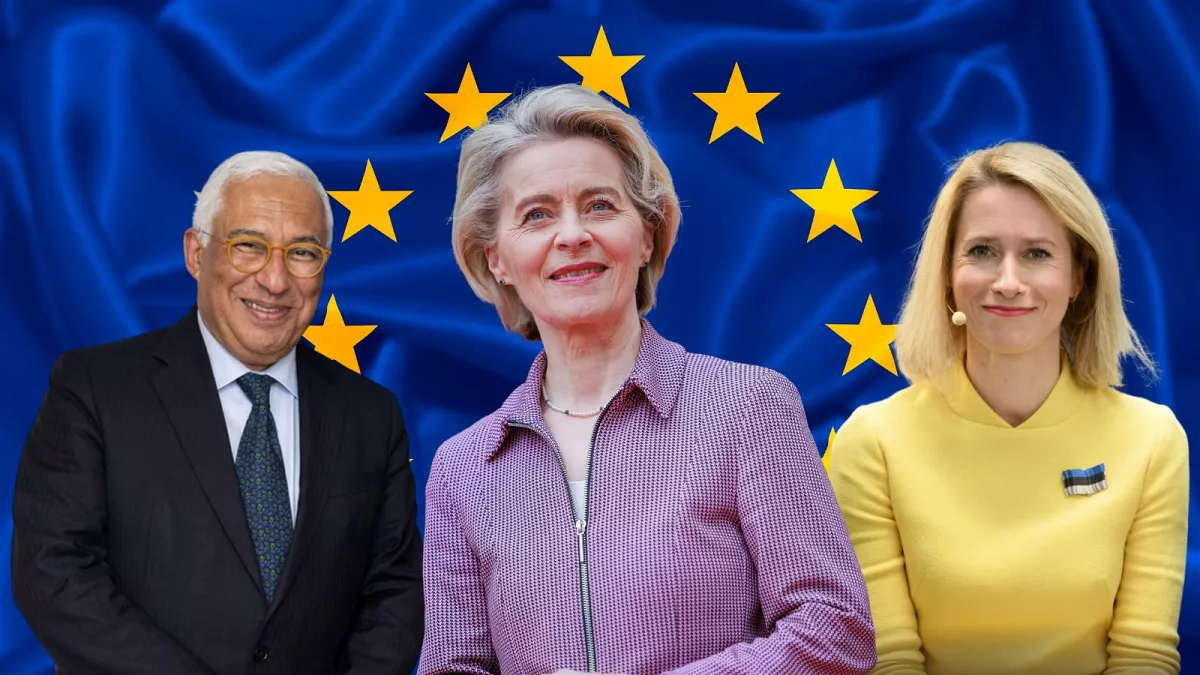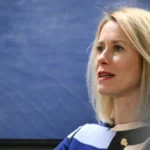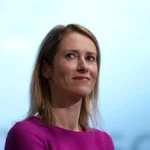EU leaders meeting at a summit agreed on Thursday 27 June to grant Ursula von der Leyen a second term as head of the Commission and to entrust European diplomacy to a strong voice on Ukraine, Estonian Kaja Kallas.
This agreement on key EU positions was quickly concluded, despite strong resistance from Italy’s Giorgia Meloni and Hungary’s Viktor Orban.
The reappointment of Ursula von der Leyen will have to be confirmed by an absolute majority of MEPs: “There is still one step […]. I will seek the approval of the European Parliament after presenting my political roadmap for the next five years,” insisted the German conservative leader.
The outcome of this vote, expected in mid-July, is uncertain, with the usual coalition of conservative, socialist and liberal MEPs weakened following the June elections.
To embody the face of EU diplomacy against the backdrop of the war in Ukraine, the heads of state and government have chosen Estonian Prime Minister Kaja Kallas – a determined opponent of the Kremlin. This 47-year-old liberal will succeed the Spaniard Josep Borrell.
“This is an enormous responsibility in these times of geopolitical tensions, with the war in Europe, the growing instability in our neighbourhood, as the main challenges”, reacted Kaja Kallas, whose position will also have to be validated by MEPs. “Kaja Kallas understands the risks coming from Russia and Belarus”, welcomed the head of the Polish government Donald Tusk.
Finally, the former Portuguese Prime Minister Antonio Costa was appointed new President of the European Council, the body bringing together the Member States. A year after his resignation over a corruption case that was ultimately poorly supported, this socialist known for being a skilled tactician and pragmatist will succeed the Belgian Charles Michel in December.
“Very quick decision”
These three candidates were the clear favourites following the agreement reached on Tuesday between six European leaders – including France’s Emmanuel Macron and Germany’s Olaf Scholz – belonging to the right-wing/social-democrat/centrist “grand coalition”, in the wake of the European elections.
Olaf Scholz welcomed on Thursday “a very quick and forward-looking decision”, in contrast to the laborious designation process that tore the Twenty-Seven apart five years ago.
However, the Hungarian nationalist Prime Minister, Viktor Orban, on Thursday castigated a “shameful” arrangement: “European voters have been deceived. [The traditional right] has formed a coalition of lies with the left and the liberals”, he had raged upon arriving at the summit.
The head of the ultra-conservative Italian government, Giorgia Meloni, had denounced an “oligarchy”, deploring having been left out of the negotiations between the three political groups. “Their proposal is wrong in method and substance. I decided not to support it, out of respect for the citizens and the signal they have in the European elections” in June, she snapped at the end of the summit. She abstained, according to a diplomatic source.
However, many leaders had shown themselves keen to spare her: if her support was not necessary – unanimity was not required – politically her voice counts. “I think there was a broad consensus, and I am sure that a way will be [found] later: I totally respect the position of Giorgia Meloni, who represents an important country,” Emmanuel Macron stressed.
Orban’s hopes
Like Viktor Orban, Giorgia Meloni intends to weigh more heavily on the choices of the future executive in Brussels, following the rise of the radical and extreme right during the European elections this month. The Italian leader’s ECR group has snatched third place from French President Emmanuel Macron’s centrist family in the European Parliament.
Rome is demanding “at the very least” a vice-presidency of the European Commission, with a “significant portfolio” to influence industrial and agricultural policy, according to its Foreign Minister Antonio Tajani.
This meeting of the Twenty-Seven was held three days before early legislative elections in France, in which the National Rally (far right) is widely expected to lead. When asked whether this election “cast a shadow” on the EU, Viktor Orban considered that on the contrary it brought a “ray of sunshine”, believing that “great things can happen [in France] on Sunday”.
For his part, Emmanuel Macron announced during a meeting with his liberal allies his wish to reappoint Thierry Breton as French member of the Commission, according to European sources. Since 2019, he has been Commissioner for the Internal Market, a vast portfolio that includes digital technology and industry.
The leaders of the Twenty-Seven also endorsed on Thursday the “strategic agenda” setting the bloc’s priorities for the next five years, emphasizing security, defense, competitiveness and the fight against irregular immigration.
Among other key EU posts, Maltese conservative Roberta Metsola appears to be the favourite to win a second two-and-a-half-year term as president of the European Parliament in Strasbourg in mid-July.
This article is originally published on france24.com








